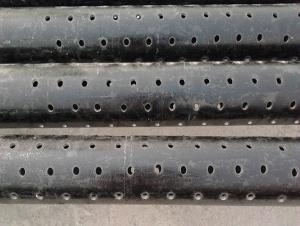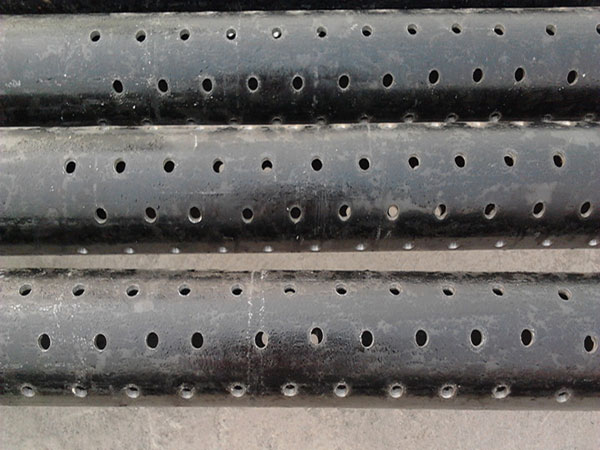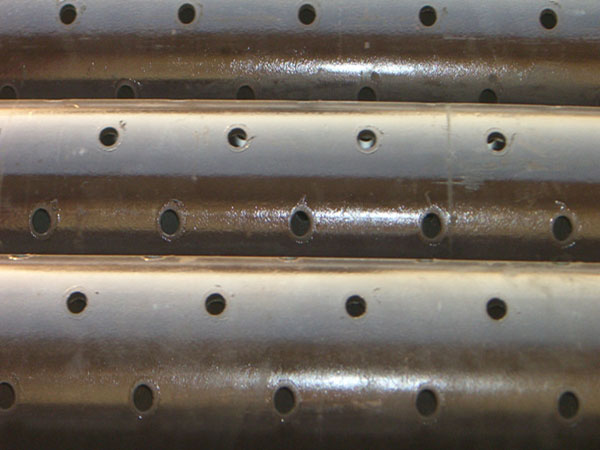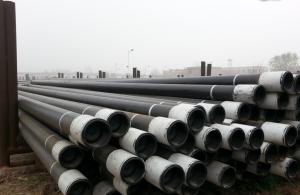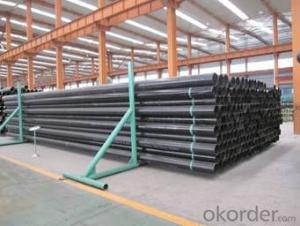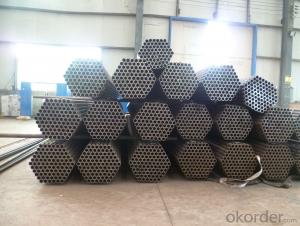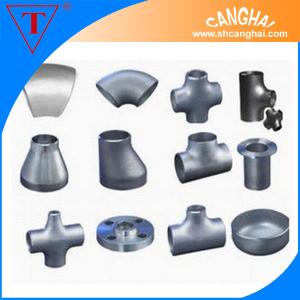Perforated Casing Pipe
- Loading Port:
- Tianjin
- Payment Terms:
- TT OR LC
- Min Order Qty:
- -
- Supply Capability:
- 20000 m.t./month
OKorder Service Pledge
OKorder Financial Service
You Might Also Like
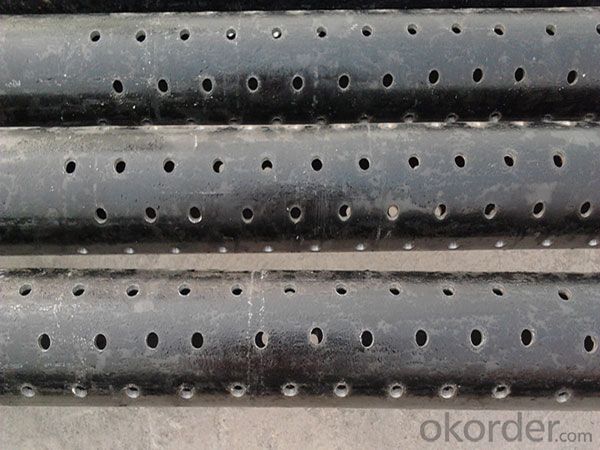
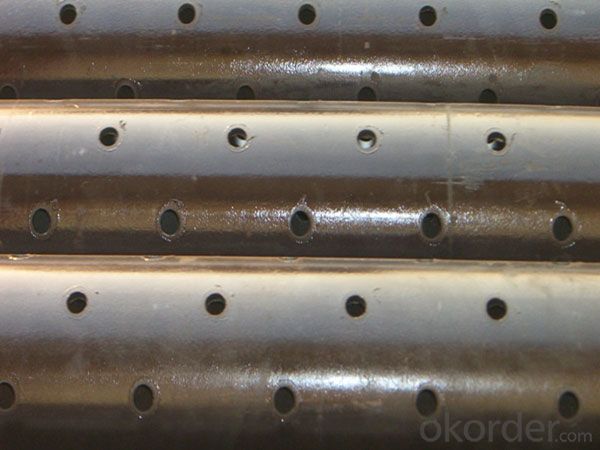
Product Descriptions :N80 Perforated Casing Pipe
1.The Perforated pipe uses J55 or N80 oil casing as the processing body. This ensures high strength and no distortion.
2.The hole is uniform,smooth,and has no burr.
3.The overall anticorrosive processing results in a dense protective layer on the surface of screen pipe,so as to improve its corrosion and wear resistance,and effectively prolong the downhole working life.
4.The perforated pipe comes with simple use. due to big inside diameter,it also brings convenience for pipe string sonfiguration.
5.The type of hole can be freely selected by the customer.
Technical Parameters
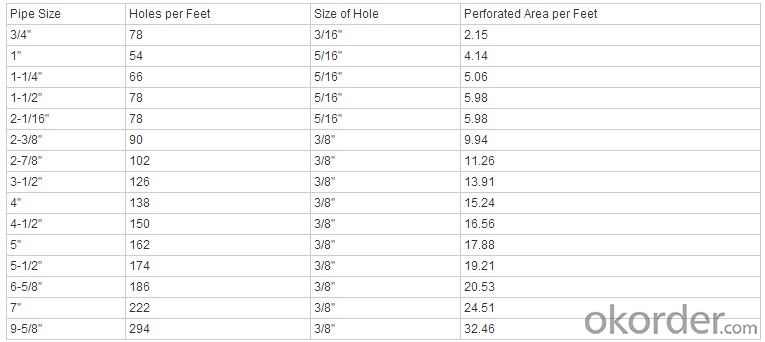
Dalipal Company is one of the most famous enterprises of china professionally producing pipeline and oil casing.We can supply API 5CT series of pipeline and oil casing with all kinds of specifications and materials.We have first-class production equipment and technology.
- Q: How are steel pipes used in the manufacturing of HVAC systems?
- Steel pipes are commonly used in the manufacturing of HVAC systems due to their durability, strength, and heat resistance. They are used to transport fluids, such as water and refrigerant, throughout the system. Steel pipes also provide structural support for the overall HVAC system, ensuring its stability and reliability.
- Q: Are steel pipes suitable for structural purposes?
- Yes, steel pipes are suitable for structural purposes. They are known for their high strength, durability, and resistance to various environmental conditions, making them ideal for use in constructing buildings, bridges, and other infrastructure projects. Additionally, steel pipes are versatile and can be easily modified and connected to meet specific structural requirements.
- Q: Can steel pipes be used for underground cable protection?
- Yes, steel pipes can be used for underground cable protection. Steel pipes provide excellent durability, strength, and resistance to external factors such as impact, corrosion, and fire. They can effectively shield and protect underground cables, ensuring their safety and longevity.
- Q: Can steel pipes be used for underground fuel storage tanks?
- Yes, steel pipes can be used for underground fuel storage tanks. Steel pipes are commonly used for various applications, including underground storage tanks for fuel. They are strong, durable, and resistant to corrosion, making them suitable for long-term storage of fuels such as gasoline, diesel, and oil. Additionally, steel pipes can be easily welded together to create a seamless and secure tank structure. However, it is important to ensure that the steel pipes used for underground fuel storage tanks are properly coated with corrosion-resistant materials to protect them from any potential damage caused by exposure to moisture or the chemicals present in the fuel. Regular inspection and maintenance are also necessary to ensure the integrity of the tank and prevent any leaks or environmental hazards.
- Q: What are the different types of steel pipe hangers?
- There are several different types of steel pipe hangers, including clevis hangers, riser clamps, beam clamps, strut clamps, and loop hangers. Each type is designed to securely support and suspend pipes in various applications, such as plumbing, HVAC, and industrial systems.
- Q: Are steel pipes suitable for underground gas lines?
- Yes, steel pipes are suitable for underground gas lines. Steel pipes are known for their strength and durability, making them a reliable choice for underground gas distribution. They have high resistance to external factors such as corrosion and impact, which is important for maintaining the integrity of the gas system. Additionally, steel pipes can withstand high pressure and temperature variations, ensuring the safe and efficient transportation of gas underground. However, it is important to note that proper installation techniques, such as corrosion protection measures, should be followed to ensure the longevity of the steel pipes and prevent any potential leaks or accidents.
- Q: What are the future trends in steel pipe manufacturing?
- Some future trends in steel pipe manufacturing include the use of advanced technologies such as robotic automation and artificial intelligence for increased efficiency and precision. There is also a growing focus on sustainability, with the development of eco-friendly manufacturing processes and the use of recycled materials. Additionally, there is a shift towards producing pipes with higher strength and lighter weight, as well as an increasing demand for customized products to meet specific industry requirements.
- Q: Seamless steel pipe 8162 and 8163 what is the difference?
- 8163 GB is fluid delivery tube, need to use eddy current detection, fluid transport, liquid, gas, solid, such as natural gas, water, gas, coal and stone, 8162 and 8163 of the popular point that is 8163 more than 8162 senior, 8163 inspection, 8162 inspection. I hope you understand!
- Q: DN150 welded steel tubes one meter multiple
- DN150 welded steel pipe according to the thickness of two specifications: outer diameter 165mm, wall thickness 4.5mm, 17.81Kg per meter weight, wall thickness of 5.5mm, 21.63Kg. per meter weight
- Q: How are steel pipes used in the construction of skyscrapers?
- Steel pipes are commonly used in the construction of skyscrapers for various purposes. They are primarily used as structural components, providing strength and stability to the building's framework. Steel pipes are used to create columns, beams, and trusses, which support the weight of the entire structure. Additionally, steel pipes are used for plumbing and HVAC systems, allowing for efficient distribution of water, air, and other utilities throughout the building. Overall, steel pipes play a crucial role in the construction of skyscrapers, ensuring their durability, safety, and functionality.
Send your message to us
Perforated Casing Pipe
- Loading Port:
- Tianjin
- Payment Terms:
- TT OR LC
- Min Order Qty:
- -
- Supply Capability:
- 20000 m.t./month
OKorder Service Pledge
OKorder Financial Service
Similar products
Hot products
Hot Searches
Related keywords
